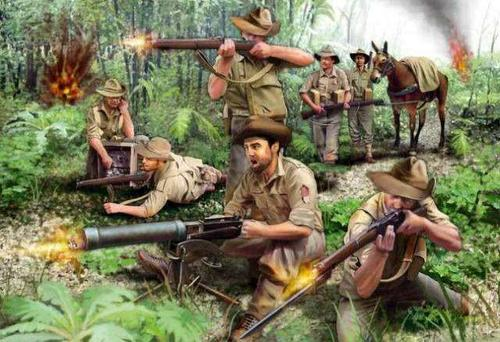"I especially hate the bad guys who make friends with kangaroos, who always use the bodies of my comrades as bait and lie in the shadows, and their snipers stare at us deadly, as soon as we show up, they are a shuttle of bullets." This is the impression of an Australian soldier written by a Japanese soldier named Kono Kotaro in his memoirs.
Kotaro Kono is a native of Nara, Japan. After the Battle of Songhu on August 13, he followed his troops on the Battlefield of China for several years. After the outbreak of Pearl Harbor, the war in Southeast Asia was strained, and Kono Kotaro followed his troops to Southeast Asia to engage Australian soldiers in the New Guinea Islands. There, they encountered adversaries better equipped and trained than the Chinese army, and the casualty rate was rising.
Although the size of the Australian Corps was not as large as that of the Us Army, it was well-trained and well-equipped, and the commander's on-the-spot adaptability and individual quality were not the same as those of the Chinese troops at that time. This caused a lot of headaches for the Japanese army. These Australians were also able to take full advantage of the conditions they already had to give the Japanese the maximum amount of damage. Their ferocity impressed the Japanese. The Australian forces caused the Japanese a lot of headaches in the sweltering and wet battlefields of Southeast Asia.
Kono Kotaro wrote in his memoirs that "..... The guys who make friends with kangaroos really hate me, they have no morality as human beings at all, and they are particularly cruel to their captives. I once saw them shooting at soldiers who raised their hands in surrender at very close quarters. After our soldiers were shot by them, they always placed them in open places to lure us to grab the corpses. Before each exchange of fire, my comrades and I all confessed to each other, and if something unexpected happened, I hoped that my comrades would bring each other's ashes back. But under the tight lockdown of The Australian machine gunners, this became a luxury. They don't give us any chances, on the contrary, they want more people to stay on the battlefield. After my compatriot Jiang Dujun was killed in battle, I tried several times with another fellow villager, Ono jun, to drag his body back without success. I suppose even cutting off a small finger would give some comfort, but every time we showed up, the Australian machine guns roared.
..... I feel very humiliated inside. I personally promised Jiang Dujun that if something happened to him, he would definitely bring his ashes back to Japan. But I really couldn't do it under the conditions at the time. I also had an injury on my leg at the time, which made my movements very inflexible. I also knew that if I wasn't careful, I would soon become a cold corpse lying there, without even a chance to return to Japan. ”
Kotaro kono and his companions finally had to face reality and dump Edo's body on the battlefield. Maybe it only takes half a day to turn into rotten meat at the high temperature for maggots to bite.
In fact, Kono Takataro deliberately left out a large paragraph in his diary. At the beginning of the Pacific War, the Japanese army not only launched a surprise attack on Pearl Harbor. Their large forces attacked british troops in the Philippines and Malaysia. There were 15,000 Australian soldiers in the British army at the time. They suffered brutal japanese shooting, assassinations, and severe beatings, and fewer than half survived. In the fighting on Ambon Island, 1,100 Australian soldiers were outnumbered and forced to surrender to the Japanese. Many of them were beheaded on the spot by the brutal Japanese army. Fewer than 300 people survived.
Therefore, the inhumane behavior of the Australian troops in the course of fighting the Japanese army was completely out of a kind of blood debt and blood compensation. The Japanese also paid a high price for their previous actions, with less than 20,000 of the 180,000 Japanese troops landing in New Guinea returning to their homeland alive.
